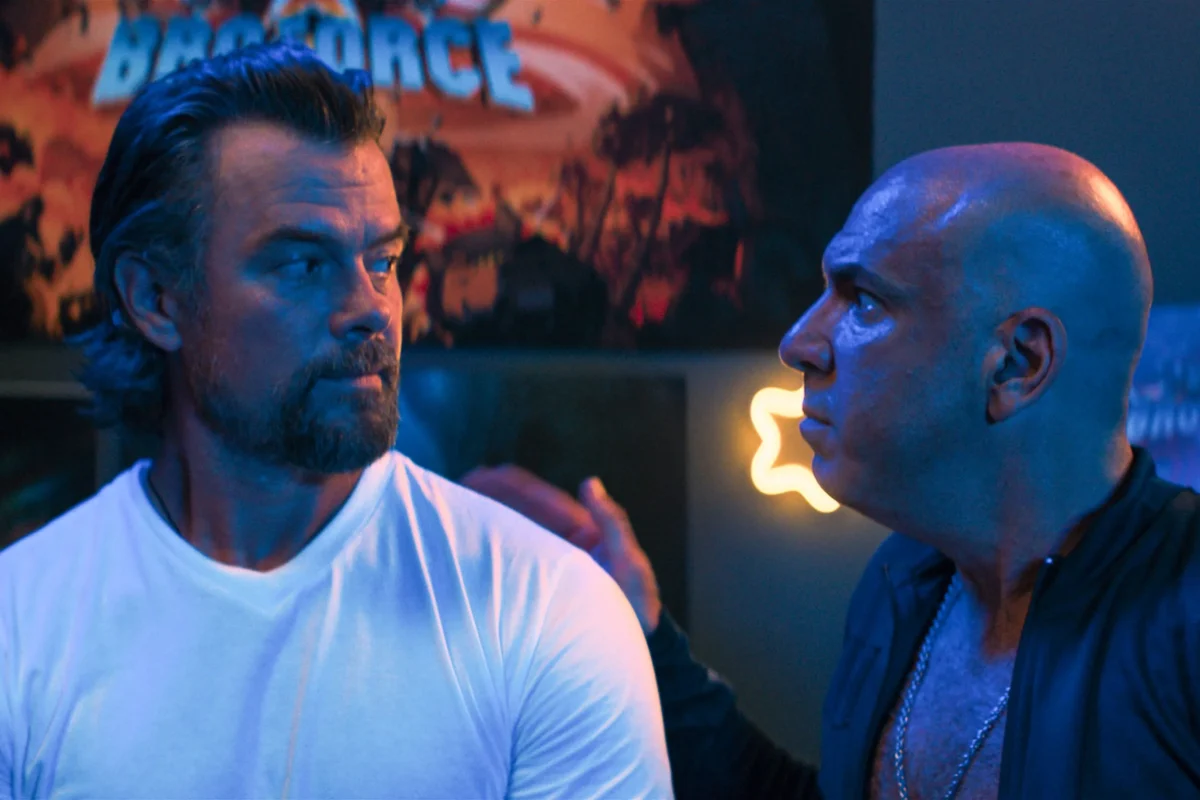Allan Ungar’s London Calling (2025) is that rare action-comedy that refuses to choose between muscle and mind. On the surface, it’s all about guns, gangsters, and gloriously bad decisions. Beneath the chaos, it’s a surprisingly tender story about regret, mentorship, and the fragile ego of fading masculinity. Josh Duhamel’s Tommy Ward — a jaded hitman chasing the ghost of his former self — ends up teaching a teenager how to kill, only to relearn what it means to live. Like its punk-rock namesake, London Calling hums with defiance — against crime, against time, and against the notion that redemption belongs only to the young.
Spoilers Ahead
London Calling (2025) Plot Summary & Movie Synopsis:
Tommy Ward once held the title of London’s most feared hitman; a name so notoriously recognized that he made criminals cower and police avert their stares. However, he is now attempting to manage a city that has passed him by completely. His reflexes are slower, his eyes are not as strong, and his name is no longer feared. It is here, at the film’s outset, that Tommy makes a crucial blunder: he slays the nephew of Freddy Darby, a London crime lord inspired by “The Godfather.” While Freddy’s wife hardly cared for the name’s bearer, Freddy could never allow the transgression to proceed unpunished.
Knowing it is time to move, and knowing he has been marked, Tommy hops the pond to Los Angeles, not out of fear but instinct. In L.A., he gets involved with Benson, a brash, cigar-smoking gangster with a collapsing fiefdom, a short fuse, and a lengthy list of grievances – headed by his timid son Julian. Julian, heavier and gentle-hearted, spends his free time LARPing instead of learning to pull a trigger. His father sees him as a failure, while Tommy sees a reflection of the son he lost touch with.
When Tommy asks Benson to help him get back to London safely, Benson agrees, on one condition: Tommy must take Julian on a ‘field trip” to learn what it really means to be a man. The task? Eliminate Alistair, a legendary hitman-turned-liability who’s threatening to spill secrets to the cops. What starts as a simple hit turns into a chaotic road trip filled with absurd violence, misplaced life lessons, and a reluctant father-son bond.
Is Julian Any Good at Being a Hitman’s Assistant?
Absolutely not, and that’s the point. Julian’s first mission is a disaster in motion. He can’t pack a trunk, can’t stomach blood, and can’t stop asking questions. Yet when Tommy tries to teach him how to shoot, it’s Julian who surprises everyone. His hours behind a gaming console pay off; he hits every target, while Tommy, too proud to wear glasses, misses all of them.
Their mismatched chemistry becomes the heart of “London Calling.” Tommy, grumpy and half-blind, represents the decaying codes of old-school hitmen, all about toughness and fear. Julian, naive but empathetic, brings a strange innocence to the criminal world. When Tommy teaches him hand-to-hand tricks like the ‘Tottenham Tickler’ and ‘Savage Badger,’ Julian accidentally gouges his mentor’s eyes. This darkly comic moment also foreshadows how he’ll later save Tommy’s life. Beneath the humor, Ungar paints a bittersweet picture of generational contrast: one man losing his grip, while another tries to understand what ‘being a man’ even means.
Why Does Alistair Want to Kill Tommy?
Alistair, the ghost of Europe’s underworld, is what Tommy fears becoming, a man undone by memory. Once a phantom assassin, Alistair has suffered a mental breakdown, tormented by the sins he can’t drink or shoot away. When Tommy and Julian botch their fake drug-dealer act with Alistair’s brother Seamus, chaos erupts. In a bloody shootout, Tommy accidentally kills Seamus, believing Alistair to be dead when an explosion consumes his RV. But Alistair survives, scarred, furious, and spiritually deranged.
For him, Seamus’s death is not just personal, it’s sacred. The hitman code may not believe in heaven or hell, but Alistair does. And when he vows to make Tommy kill himself, it’s not just revenge, it’s purification. Alistair’s obsession with divine justice makes him one of the film’s most complex villains. He doesn’t kill out of greed. He kills to send souls to where he believes they belong. In Tommy, he sees the ultimate heretic, a man who kills without meaning, without faith, without consequence.
Why Do Benson and Julian Betray Tommy?

Also Read: The 35 Best Movies of 2025 (So Far)
In a genre full of betrayals, “London Calling” turns its knife slowly and deeply. When Freddy Darby arrives in LA hunting for Tommy, he strikes a deal with Benson: deliver Tommy, and Benson gets a massive arms deal at a discount. To seal it, Benson manipulates Julian into thinking Tommy despised him. He tells the boy that Tommy demanded extra payment for ‘putting up’ with him, poisoning the trust they had built.
Julian, desperate for approval and angry at Tommy’s gruffness, doesn’t see the trap. When Tommy finally lets his guard down, teaching Julian how to drive, Freddy’s men capture him. Benson’s betrayal lands like a gut punch, not just because it’s predictable, but because it’s personal. Benson doesn’t just sell out Tommy. He sells out the mentorship Tommy and Julian were building. The older man’s cynicism and the younger man’s insecurity become twin tragedies, one shaped by greed, the other by guilt.
How Do Tommy and Julian Kill Alistair?
Just when Freddy prepares to execute Tommy, fate, or perhaps karma, intervenes. Alistair storms in, killing Freddy’s crew in a blaze of righteous insanity. What follows is a standoff between three men who’ve all lost something to ego and violence. Alistair and Freddy argue over who deserves to kill Tommy more, one seeking vengeance for family, the other for pride. Tommy uses the chaos to turn the tables, shooting his way out and escaping, but Alistair kidnaps Julian, setting the stage for a brutal showdown.
In the film’s climactic sequence, Tommy faces Alistair in the same desolate spot where Seamus died. Alistair demands that Tommy shoot himself as penance. Tommy pretends to obey, firing into his own chest, but he’s wearing a vest. When Alistair realizes the trick, he hands Tommy extra bullets to ‘finish the job.”
That arrogance costs him. Julian, remembering Tommy’s lesson, gouges Alistair’s eyes and escapes. In the ensuing chaos, Tommy empties his gun into the madman, but Alistair refuses to die, crawling forward like a demon of Tommy’s past. Julian rams a car straight into him, crushing both Alistair’s body and his god complex. It’s messy, violent, and weirdly poetic, a final act where Tommy’s worst instincts and best intentions collide.
London Calling (2025) Movie Ending Explained:
Does Tommy Redeem Himself?
The final moments bring “London Calling” full circle, not with blood, but with laughter. After all the chaos, Tommy helps Julian win his LARP battle against Barnabus, hilariously punching kids half his age as if they were rival mobsters. It’s crude, cathartic, and genuinely funny, a reminder that Ungar’s film never forgets its comedic soul. Later, Tommy returns to London. He visits his ex-wife and son, now older and safely distant from his criminal world. In a bittersweet twist, Tommy takes over Freddy’s old gym, teaching self-defense to kids, including his own son. The camera lingers as Tommy corrects a boy’s stance, echoing how he once taught Julian.
This ending isn’t about redemption through repentance, but through mentorship. Tommy can’t erase the lives he’s taken, but he can shape the ones ahead of him. The hitman who once taught people how to kill now teaches them how to fight back. “London Calling” plays like a love letter to late-’90s action comedies, fueled by sarcasm, sentiment, and slow-motion gunfights.
Yet beneath its banter and bloodshed lies a surprisingly human question: can a man born into violence ever pass on peace? For Tommy Ward, redemption doesn’t arrive with forgiveness; it arrives with responsibility. In teaching Julian how to survive, he accidentally learns how to live. And by the time the credits roll, his greatest hit isn’t the one he pulled the trigger on, it’s the one where he finally lets go.
![Manmarziyaan [2018] Review: Crazy, Stupid Love Indeed](https://79468c92.delivery.rocketcdn.me/wp-content/uploads/2018/10/Manmarziyan_HIGH_ON_FILMS1-768x384.jpg)
![Hanging Gardens (Janain Mualaqa) [2022] ‘Venice’ Review: Children Learning The True Meaning Of Exploitation And Commercialization](https://79468c92.delivery.rocketcdn.me/wp-content/uploads/2022/09/Hanging-Gardens-2022-Review-768x576.jpeg)



